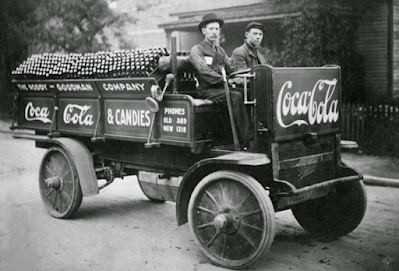Coca-Cola, the world's most famous and beloved soft drink, has a rich and fascinating history that stretches back over a century. Born out of a pharmacist's quest to create a medicinal tonic, Coca-Cola has evolved into a global brand that transcends cultures and borders. This article traces the captivating journey of Coca-Cola, from its humble beginnings to its status as an iconic symbol of American culture and capitalism.
1. The Origins:
In 1886, Atlanta pharmacist Dr. John S. Pemberton concocted a caramel-colored syrup intended to serve as a patent medicine. Pemberton's tonic, which he initially named "Pemberton's French Wine Coca," contained extracts from coca leaves and the kola nut, along with other flavoring agents. He marketed it as a remedy for various ailments, including headaches, fatigue, and morphine addiction.
2. The Birth of Coca-Cola:
Amidst increasing temperance movements and legal restrictions on alcohol, Pemberton reformulated his tonic to create a non-alcoholic version. On May 8, 1886, he introduced the new beverage at Jacob's Pharmacy in downtown Atlanta. Renamed "Coca-Cola" by Pemberton's bookkeeper, Frank M. Robinson, the drink quickly gained popularity for its refreshing taste and supposed medicinal properties.
3. Expansion and Branding:
Recognizing the potential of Coca-Cola, Atlanta businessman Asa Candler acquired the rights to the formula in 1888 for a mere $2,300. Candler's ambitious marketing strategies, including widespread distribution and innovative advertising, helped Coca-Cola expand rapidly across the United States. By the turn of the century, Coca-Cola had become a household name, with its distinctive logo and trademarked contour bottle solidifying its brand identity.
4. Global Expansion:
The 20th century saw Coca-Cola's reach extend beyond American shores. In 1906, the company began bottling operations in Canada, marking its first international venture. Over the following decades, Coca-Cola expanded its presence worldwide through a combination of franchising, partnerships, and aggressive marketing campaigns. Today, Coca-Cola products are available in virtually every country on earth, making it one of the most widely recognized brands in history.
5. Cultural Impact:
Beyond its commercial success, Coca-Cola has left an indelible mark on global culture. The company's advertising campaigns, featuring iconic slogans such as "The Pause That Refreshes" and "It's the Real Thing," have become ingrained in popular consciousness. Coca-Cola's presence in films, music, and sporting events has further cemented its status as a symbol of youth, happiness, and Americana.
6. Diversification and Challenges:
In response to changing consumer preferences and health concerns, Coca-Cola has diversified its product portfolio over the years. The company introduced Diet Coke in 1982, followed by a range of other low-calorie and zero-sugar options. Despite its enduring popularity, Coca-Cola has faced challenges, including backlash over its environmental practices, criticism of sugary beverages, and competition from rival brands.
7. Legacy and Future:
As Coca-Cola celebrates its quasquicentennial anniversary, it continues to adapt and innovate in an ever-changing market. While its core product remains the flagship Coca-Cola Classic, the company has expanded into new categories, including energy drinks, bottled water, and ready-to-drink coffee. With a focus on sustainability and community engagement, Coca-Cola aims to ensure its legacy endures for generations to come.
From its humble origins as a medicinal tonic to its status as a global phenomenon, the history of Coca-Cola is a testament to the power of innovation, branding, and cultural influence. As it enters its 14th decade, Coca-Cola remains an enduring symbol of refreshment, joy, and the American Dream.

